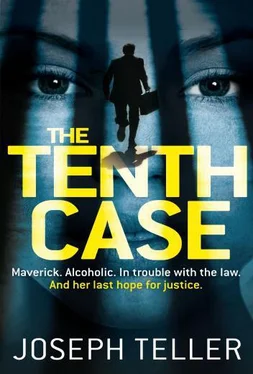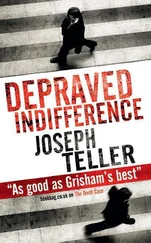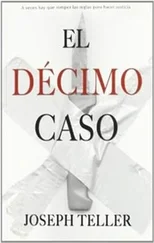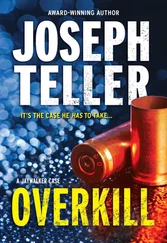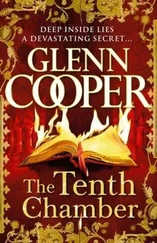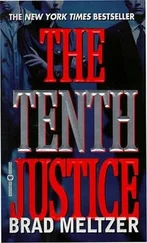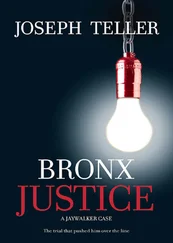Joseph Teller - The Tenth Case
Здесь есть возможность читать онлайн «Joseph Teller - The Tenth Case» — ознакомительный отрывок электронной книги совершенно бесплатно, а после прочтения отрывка купить полную версию. В некоторых случаях можно слушать аудио, скачать через торрент в формате fb2 и присутствует краткое содержание. Жанр: Криминальный детектив, на английском языке. Описание произведения, (предисловие) а так же отзывы посетителей доступны на портале библиотеки ЛибКат.
- Название:The Tenth Case
- Автор:
- Жанр:
- Год:неизвестен
- ISBN:нет данных
- Рейтинг книги:3 / 5. Голосов: 1
-
Избранное:Добавить в избранное
- Отзывы:
-
Ваша оценка:
- 60
- 1
- 2
- 3
- 4
- 5
The Tenth Case: краткое содержание, описание и аннотация
Предлагаем к чтению аннотацию, описание, краткое содержание или предисловие (зависит от того, что написал сам автор книги «The Tenth Case»). Если вы не нашли необходимую информацию о книге — напишите в комментариях, мы постараемся отыскать её.
The Tenth Case — читать онлайн ознакомительный отрывок
Ниже представлен текст книги, разбитый по страницам. Система сохранения места последней прочитанной страницы, позволяет с удобством читать онлайн бесплатно книгу «The Tenth Case», без необходимости каждый раз заново искать на чём Вы остановились. Поставьте закладку, и сможете в любой момент перейти на страницу, на которой закончили чтение.
Интервал:
Закладка:
Six men, six women. Eight white, one black, one His panic, one Asian, one Middle Eastern. Six Catholics, two Protestants, one likely Buddhist, and three question marks. No one with anything more than a master's degree, if that.
Backed up by six alternates of assorted sizes, shapes, colors and religious backgrounds, these were the jurors who would ultimately decide Samara Tannenbaum's fate. On a scale of ten, Jaywalker might have given them a collective two or three, at very best. But the truth was, he wasn't interested in who they'd been when they'd first walked into the courtroom. He'd had his two minutes with each of them since then-his chance to condition them, to desensitize them to the worst Tom Burke could possibly throw at them. And, yes, his chance to brainwash them. If he'd failed, the fault was his, and no one else's.
Though the consequences would be Samara's.
18
When he'd begun trying cases, more than twenty years ago, Jaywalker had been schooled in the Legal Aid Meth od. Whatever you did, they'd taught him, never commit to any single defense or trial strategy, lest something happen in the middle of the trial to turn you into a fool and your client into a convict. Keep your options open at all times. Play things close to the vest. Adopt a wait-and-see attitude. Avoid unnecessary risks.
The first way you put those guiding principles into action, they explained, was to refrain from making an opening statement. Or, if you absolutely insisted upon making one, you were to keep it short, general and non committal. Talk, if talk you must, about maintaining an open mind, waiting until all the evidence was in before drawing any conclusions, and keeping your eyes and ears open, and your nose to the grindstone.
To Jaywalker's way of thinking, it made no sense at all. As far as he was concerned, about all you got by keeping your nose to the grindstone was a smaller nose.
Still, he'd given it a try. And what he'd gotten for being a good soldier were convictions. Not always, but a good half of the time out. "Fifty percent acquittals?" said his supervisor. "That's fabulous! "
Not to a perfectionist, it wasn't. Not to Jaywalker.
So over time he gradually abandoned the Legal Aid Method in favor of the Jaywalker Method. By the time he went out on his own two years later, he was committing to a particular trial strategy long before jury selection even began. He knew precisely what his defense would be, whether or not his client was going to testify, what he would say when he did, and how he would say it. And he told the jurors, at the very first opportunity.
He discovered that the opening statement, long avoided as nothing but a death trap by the mavens at Legal Aid, pre sented the perfect opportunity to shape the course of ev erything that followed. Why wait for a poorly educated, inarticulate defendant to haltingly tell his story from the witness stand, interrupted by questions, objections and rulings until it came out like some jerky, stop-and-go amateur home movie, when Jaywalker himself could present it to the jury in free-flowing, wide-screen, threedimensional, stereophonic, living color?
Almost immediately, his acquittal rate jumped to seventy-five percent. And while he continued to work on perfecting the rest of his trial skills until that number would climb into the low nineties, never again would he miss an opportunity to open, and to open expansively.
Samara's case would be no different.
That said, months had gone by in which Jaywalker had had absolutely no clue what he could possibly say in his opening. The problem was a direct corollary of his cer tainty that not only was Samara guilty as charged, but that her case was all but unwinnable.
A lot of criminal defense lawyers-including Jaywalker himself in the early days of his career-went into such a trial hoping to somehow discover a defense in the testi mony. A key prosecution witness would fail to material ize, perhaps, or recant his previous version of the facts. A cop would screw up, either in his paperwork, on the stand, or both. An inexperienced prosecutor would inadvertently leave something important out of his case. Manna would fall from the heavens.
But Jaywalker had come to learn that on overwhelming cases, there were always other witnesses who would show up, who wouldn't recant. That there would be other cops who wouldn't screw up. That Tom Burke was not only ex perienced, but talented and extremely thorough. And that manna rarely, if ever, fell from heaven. So going into the most daunting trials, along with bringing his own experi ence, talent and thoroughness, Jaywalker always brought something else with him. Always.
What he brought was a theory.
And he would share that theory with the jurors early on, so that even as the prosecutor's evidence came in and piled up and threatened to crush the defense table with its sheer weight, the jurors would at the very least have an alterna tive framework in which to consider that evidence.
There was another thing Jaywalker liked to do, and that was to concede things. If he was trying a possession of stolen property case, for example, he would readily concede that the property had in fact been stolen, that the defendant had indeed possessed it, and that it was even worth whatever dollar amount the prosecution's expert claimed it was. But, Jaywalker would argue, the defendant hadn't known it was stolen, and without that essential knowledge, he wasn't guilty. Making concessions not only narrowed the focus of the trial to something debatable, it carried the added benefit of earning both Jaywalker and his client credibility with the jury, so that when it came time to argue about whether or not the defendant had known of the theft, the jurors were open to the possibility that he hadn't. After all, he'd been so forthcoming and honest in admitting all those other things, didn't it follow that his one denial deserved deference?
Weeks ago, when Jaywalker had finally allowed himself to at least consider the remote possibility that Samara wasn't guilty, he'd been forced to come up with a theory of defense. The lack of phone calls to or from Barry after she'd gotten home had left her utterly without an alibi. Selfdefense wouldn't work, with Samara continuing to insist she'd never stabbed Barry, not even to protect herself from attack or abuse, whether real, threatened or merely imag ined. And with Samara looking and sounding perfectly normal and having no history of mental illness, insanity was out of the question.
It had been the discovery of the Seconal, along with Samara's insistence that she knew absolutely nothing about it, that had ultimately provided Jaywalker with a theory. Someone had framed Samara. Someone had murdered Barry and then gone to great lengths to not only cover his own tracks, but to plant evidence making it look as though Samara had committed the crime. He'd been smart enough to know that in looking to solve a murder, particularly one without a robbery component, the police invariably focused their suspicions on the husband or wife, boyfriend or girl friend. And hadn't they done just that in Samara's case?
Sure, it was a long shot. But when you were down to one shot, it didn't much matter how long or short it was. You took it, and you hoped for the best.
Now it was time to tell the jurors about it.
For the first time since they'd been selected, the jurors took their permanent seats, assigned to them in the order in which they'd been chosen. They were sworn in once again, this time as a body. The judge then spoke to them for twenty minutes, explaining their function and his, and outlining the course of the trial that was about to begin in earnest. Then it was Tom Burke's turn to open. He spoke for fifteen minutes, pretty much following the book that all prosecutors seem to use. First he read the indictment, lin gering an extra beat on the word murder. Then he com pared his opening statement to a table of contents, a guide to what he intended to prove through his witnesses and by his exhibits. Next he got down to specifics. He told the jurors about the discovery of Barry Tannenbaum's body; the next-door neighbor's account of having heard Barry and his wife "Sam" arguing; Samara's lies to the detectives; the finding of the bloodstained evidence in her town house; the DNA match of that evidence to a known sample of Barry's; and finally the piece de resistance, the motive, the life insurance policy application, complete with Samara's signature. It was strong stuff, and Jaywalker couldn't help but notice that more than a single pair of jurors' eyes rolled upward as the list grew in length and weight. Finally Burke did what all prosecutors do.
Читать дальшеИнтервал:
Закладка:
Похожие книги на «The Tenth Case»
Представляем Вашему вниманию похожие книги на «The Tenth Case» списком для выбора. Мы отобрали схожую по названию и смыслу литературу в надежде предоставить читателям больше вариантов отыскать новые, интересные, ещё непрочитанные произведения.
Обсуждение, отзывы о книге «The Tenth Case» и просто собственные мнения читателей. Оставьте ваши комментарии, напишите, что Вы думаете о произведении, его смысле или главных героях. Укажите что конкретно понравилось, а что нет, и почему Вы так считаете.
